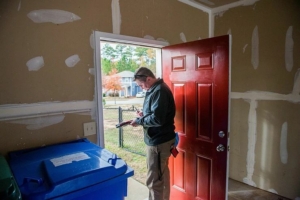
New homes are being built left and right now that the industry has fully recovered from the supply freeze of 2020 and 2021. Buyers are excited at the chance to be the first people to live in a home: but is new always better?
If you’re considering buying a new home, it’s a good idea to have it inspected: these are the top reasons why!
New Doesn’t Always Mean Good
Although we’ve been conditioned to think of new as good and perfect, that’s not always how it goes. Although most contractors work hard and want to create a property that’s valuable and attractive: new homes aren’t always good homes. If a company is on a tight deadline and wants to get out as many homes as possible: it can take less than two months for them to put a house together. Although insulated concrete forms can cut down the time by a lot, any house that takes less than three months to build should be carefully checked.
Your Foundation is New and Untested
Your new foundation is in perfect condition: but that doesn’t mean it will stay that way. If it’s not a good foundation, or they didn’t level the ground out correctly before they laid it, it can crack within the first year. An expert will look at the drainage, what type of soil is used, and if there are any structural problems that can be spotted right off the bat. This can save you from buying a home that will immediately need a lot of work.
Your Roof Needs to Be High Quality

Roofs protect our properties from rain, temperature imbalances, and countless other issues that aren’t fun to deal with. Although the roof is new and might look nice, an inspector will make sure that it will properly protect your home and that you won’t need a roof cover board to go back and correct their mistakes.
A good inspector will also be able to tell you if they actually used composite insulated roof panels or if that’s just something the company is saying for advertising.
Electrical System Issues Can Cause Fire
If builders were really running through a project, the last place you want them to cut corners is in the electrical work. A bad electrical system can cause a fire and lead the house to burn down, or at least damage your property. Your home inspector will check to ensure everything was put in correctly and that the electrical system is giving them the readings they expect to see.
Termites Don’t Only Bother Old Houses
Many assume that termites only bother older homes, but this simply isn’t true. Termites will dig into any wood available, and this isn’t always the fault of the builder. They should take steps to seal and protect the wood, but sometimes termites find a way anyway; it’s good to know before you accidentally buy a termite-ridden home. Your inspector will be great at noticing signs of termites and will let you know if there are any reasonable solutions the seller should do before you buy.
If They Cut Corners, You Need to Know

Cutting corners in home construction can lead to things like light switches that don’t work or gas lines that are disastrously connected incorrectly. Although you may know about houses and assume you’ll catch everything, an inspector has been doing this as their job for long enough that they catch far more than the average person. Their duties are far less expensive than buying a lemon of a house and then trying to fix it up despite already overpaying for it in the first place.
How Sealed Is This Property
How well sealed your home is will decide how your HVAC bills will look. Heating and cooling bills can go out of control if they don’t attach the soffit panels correctly or if the windows are allowing a steady stream of air into the home. The inspector will look at every possible entrance to the home and will let you know if they feel like it’s a safe and good space to live in.
Would You Feel Safe Living There
An inspector’s main job is to ensure this property is a safe investment: but it’s also to make sure you’ll feel safe living there. Instead of questioning if everything works alright, you can focus on things like how you’re going to paint your bathroom or decorate your child’s room. This is a space where you’ll live and build memories, so it’s important that you thoroughly research it before moving in.
An Inspection Is Always Important

Whether you’re buying a brand new house and want to have it double-checked, or you had a home built, and you want to review it, an inspection is vital. Have a professional walk through your property so you can rest easy knowing it’s in great shape.
Brian Jeffries is the content director for the Innovative Building Materials blog and a content writer for the building materials industry. He is focused on helping fellow homeowners, contractors, and architects discover materials and methods of construction that save money, improve energy efficiency, and increase property value.







